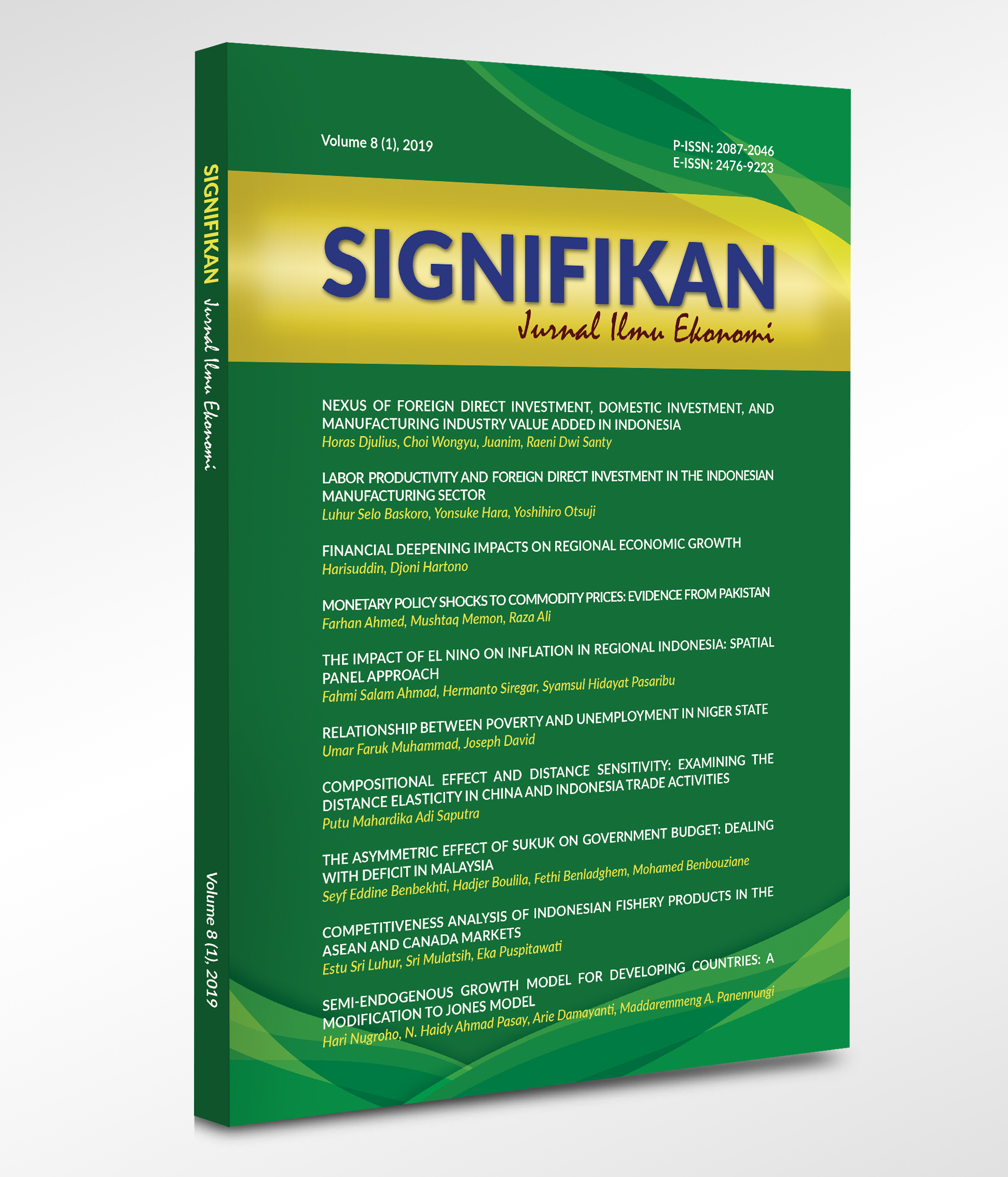The Relationship between Poverty and Unemployment in Niger State
DOI:
https://doi.org/10.15408/sjie.v8i1.6725Keywords:
poverty, unemployment, logit modelAbstract
The nature of the relationship between the twin problem of poverty and unemployment has been unclear recently. Although the nature of the relationship has received more extensive scholarly attention worldwide and even in Nigeria, no study raised on the nature of its relationship in the region (state) which might produce an inverse relationship different from the proportionate obtained in previous studies. Hence the study on the relationship between poverty and unemployment in Niger state, Nigeria, using descriptive and a logistics regression model to analyze the 102 cross-sectional data randomly collected from the three geopolitical regions in the state. The result thus shows the existence of a proportionate relationship between poverty and unemployment, following the pattern of previous studies. The study thus recommends the actions of the policymakers in creating vocational skill programs to the aid-curb unemployment problem in the state. Accordingly, the increase in expenditure on education and the minimum wage as well recommended.
References
Agenor, P-R. (2004). Unemployment-Poverty Trade-offs. Policy Research Working Paper No. WPS 3297. Washington DC: World Bank.
Aiyedogbon, J. O., & Ohwofasa, B. O. (2012). Poverty and Youth Unemployment in Nigeria: 1987-2011. 3(20), 269–279.
Akwara, A. F., Akwara, N. F., Enwuchola, J., Adekunle, M., & Udaw, J. E. (2013). Unemployment and Poverty : Implications for National Security and Good Governance in Nigeria. International Journal of Public Administration and Management Research, 2(1), 1–11.
Ayala, L., Cantó, O., & Rodríguez. (2011). Poverty and The Business Cycle: The Role of The Intra-household Distribution of Unemployment. Working Paper ECINEQ WP 2011-222, Madrid: ECINEQ.
Egunjobi, & Adenike, T. (2014). Poverty and Unemployment Paradox in Nigeria. IOSR Journal of Humanities and Social Science, 19(5), 106–116. https://doi.org/10.1007 /s13398-014-0173-7.2
Enofe, A. O., Oriaifoh, C. L., & Omagbon, P. (2016). Poverty and Unemployment and Corruption in Nigerian Public Sector. IIARD International Journal of Economics and Bussines Management, 2(2), 79–90.
Mehmood, R., & Sadiq, S. (2010). The Relationship between Government Expenditure and Poverty: A Cointegration Analysis. Romanian Journal of Fiscal Policy, 1(1), 29–37.
Nwosa, P. I. (2014). Government Expenditure, Unemployment and Poverty Rates in Nigeria. JORIND, 12(1), 77–84.
Oduwole, T. A. (2015). Youth Unemployment and Poverty in NIgeria. International Journal of Sociology and Anthropology Research, 1(2), 23–39.
Ogbeide, E. N. O., & Agu, D. O. (2015). Poverty and Income Inequality in Nigeria: Any Causality? Asian Economic and Financial Review, 5(3), 439–452. https://doi.org /10.18488/journal.aefr/2015.5.3/102.3.439.452
Omojolaibi, J. A., & Omojolaibi, P. O. (2014). Economic Growth, Unemployment and Poverty in Nigeria: A Macro-econometric Analysis. IJE, 8(2), 179–195.
Osinubi, T. S. (2005). Macro-Econometric Analysis of Growth, Unemployment and Poverty in Nigeria. Pakistan Economic and Social Review, XLII(2), 249–269.
Ryscayage, P. M. (1982). Employment Problems and Poverty: Examining the Linkages. Monthly Labor Review, 105(6), 55–59.
Sa’idu, B. A., Sai’du, A. S., & Mainasara, S. S. (2013). An Examination of Poverty Among Households in Minna Capital. Journal of Biology, Agricultural and Healthcare, 3(6), 153–163.
Siyan, P., Adegoriola, A. E., & Adolphus, J. A. (2016). Unemployment and Inflation: Implication on Poverty Level in Nigeria. MPRA Paper No. 79765.


